What designers often neglect, What makes an entertainment interesting, Seeing with new eyes
Weekly I/O #108: Venue in Product Design, Three Factors in Entertainment Experience, New Eyes not Lands, Give Reason to Listen, Intensity is Price of Excellence
This week's edition of the newsletter is free to everyone! If you enjoy reading Weekly I/O, please share it with others who might also like it. You'll have a chance to win a free paid subscription for one, three, or six months 🙌
Hey friends,
This week's inputs consist of two longer ones and three shorter ones, two of which are from the book that I've recently been rereading and taking notes from.
Also, I have finally started reading Leo Tolstoy's War and Peace. Wish me luck 🤞
As usual, here's a list of things I enjoyed learning this week:
Input
Here's a list of what I learned this week.
1. Product and game designers often neglect the physical spaces where users interact with their products. The same app feels different in a living room, at a desk, and on the subway. The venue dramatically shapes the user experience, dictating whether it should be intense, social, relaxing, or brief.
Book: The Art of Game Design
Game designers spend hours debating whether to focus on PC, console, or mobile, but they often overlook a fundamental question: where will people actually play this game?
Venue is the physical environment where gaming happens. The same game feels completely different in your living room versus your office desk versus the subway.
For example, private venues enable deep immersion. There are three major private venues:
The hearth (living room with TV) works for social games like Wii Sports.
The workbench (desk, workspace) supports intense, lengthy experiences that demand focused attention and connection with virtual communities rather than family.
Reading corners (comfy chairs away from distractions) prefer relaxing experiences like simple iPad games.
In public venues, games struggle to gain traction due to distractions, but hybrid places, like gaming tables or playgrounds, create unique interactive dynamics.
Then there is the new "anywhere" venue, which is wherever you are with your smartphone. Life in this venue is defined by constant interruptions. A successful mobile game is playable in tiny bites. Its interface has to be simple enough to use while standing on a crowded train.
Each venue has distinct properties driving design decisions. Therefore, a game designed for subway commutes needs completely different mechanics than one meant for family living rooms.
This venue concept is from the book about game design, but it applies to all product design in general.
For instance, consider designing a product for information absorption. In environments where people are driving or walking, podcast products with lower information density are more desirable. Short posts and videos are ideal for bathroom breaks, while places where individuals eat alone are perfect for mid-length YouTube videos.
Therefore, we can ask these three questions next time when designing a new product experience:
What venue best suits my intended experience?
What special properties does my venue have?
How can my product elements harmonize with the chosen space?
2. Three factors that make an entertainment experience interesting: Inherent Interest (natural appeal), Poetry of Presentation (aesthetic quality), and Projection (audience immersion through empathy and imagination).
Book: The Art of Game Design
Why do we find some performance interesting while some not? Game designer Jesse Schell broke down what makes an entertainment experience enjoyable into three key factors: Inherent Interest, Poetry of Presentation, and Projection.
The first factor is Inherent Interest. Some ideas are more naturally engaging than others.
Wrestling an alligator beats eating a cheese sandwich every time. Our brains are more curious about risk over safety, unusual over ordinary, and dramatic change over stability. Some content simply has built-in appeal that matches our psychological drives. That's why a daring rescue in an action movie always commands our attention more than everyday events.
The second factor is Poetry of Presentation, the artistry and aesthetic quality of the experience.
How is the story told? Beautiful writing, clever cinematography, and masterful design can elevate any concept. Even inherently interesting material can fail due to poor presentation, while exceptional artistry can make ordinary moments truly memorable. However, keep in mind "Don't make a brilliant image of a fuzzy concept".
Finally, there's Projection, the magic that happens when an experience invites you to use your empathy and imagination to become a part of its world. We care more about events happening to us than to others.
Storytellers create this connection by developing characters we can relate to and care about. When we feel what the character feels, we are projecting ourselves into the story. This sense of immersion, where we mentally enter the world of the experience, is what makes us feel truly invested.
Let’s use this framework to examine some entertainment experiences.
Street performers juggling running chainsaws is an inherently interesting event despite its limited poetry. But there's some projection: as it is easy to imagine what it would be like to catch the wrong end of a chainsaw.
On the other hand, a violin concerto relies heavily on the poetry of presentation because two sticks rubbing together isn't usually inherently interesting, and the projection isn't common.
How about the popular video game Tetris? An endless sequence of falling blocks leaves little room for inherent interest or poetry of presentation. However, the projection can be intense because you make all the decisions. Whether you beat the game or not solely depends on your performance. This is a shortcut that traditional storytelling cannot take.
3. "The real act of discovery consists not in finding new lands but in seeing with new eyes." — Marcel Proust
Quote
Three things came to my mind when I first read this quote.
You should write more, but don't hinge on what you have written. The writing is not the final product. Instead, the writer is the product, being iterated, improved, and honed through all the published writing.
The job of the startup is to grow the founder so that the founder can develop and continue to lead the startup.
A change in perspective is worth 80 IQ points.
4. No one wants to hear anything you ever have to say unless you give them a reason to listen. It's your responsibility to entertain them and give them a reason.
Podcast: The Storytelling Expert: Hidden Triggers That Make People Act | Matthew Dicks
You should assume that no one wants to hear anything you say unless you give them a reason to listen. It's your responsibility to engage them and provide that reason.
Just like researchers should spend the same time on selling their work as doing their research, writers must not avoid selling their work.
Moreover, spending time selling the work is not enough. You must understand your readers' emotions and make sure they resonate with your delivery. You must hone the craft of ensuring they can perceive the value you provide.
As a writer, it is your responsibility to find your readers, not your readers' responsibility to find you.
It's your responsibility to help readers understand the value of your work, not your readers' responsibility to understand the value themselves.
5. "Intensity is the price of excellence." — Warren Buffet
Quote
This quote is from the book Snowball, where Warren Buffett explains his reasons for acquiring Ben Rosner's company.
During a luxury dinner party, Rosner's business rival mentioned the costs associated with his toilet paper. Although Rosner had purchased his toilet paper inventory at a much lower price, the price gap raised his suspicions.
Instead of enjoying the festivities, Rosner excused himself, drove to his warehouse, and started counting toilet paper sheets. His instincts were correct: vendors had claimed there were 500 sheets per roll, but they were shortchanging him.
Warren Buffett found this story fascinating. Why would anyone abandon a ballroom to count toilet paper?
Buffett bought Rosner's business for $6 million, believing that such intensity was non-negotiable for excellence. As he put it: "Intensity is the price of excellence."
Recap
Try answering these five simple questions to review and reinforce what you've learned:
Thanks for reading!
One small favor: please share which input you found the most helpful or intriguing! Just comment on Substack with a number!
It only takes 6 seconds to like and comment, while writing each newsletter takes me 6 hours 🫶
And as always, feel free to send me any interesting ideas you came across recently!
Looking forward to learning from you,
Cheng-Wei
Subscribe to Cheng-Wei’s Update | Subscribe to 程維的中文更新 | Subscribe to Weekly I/O | Facebook | Twitter



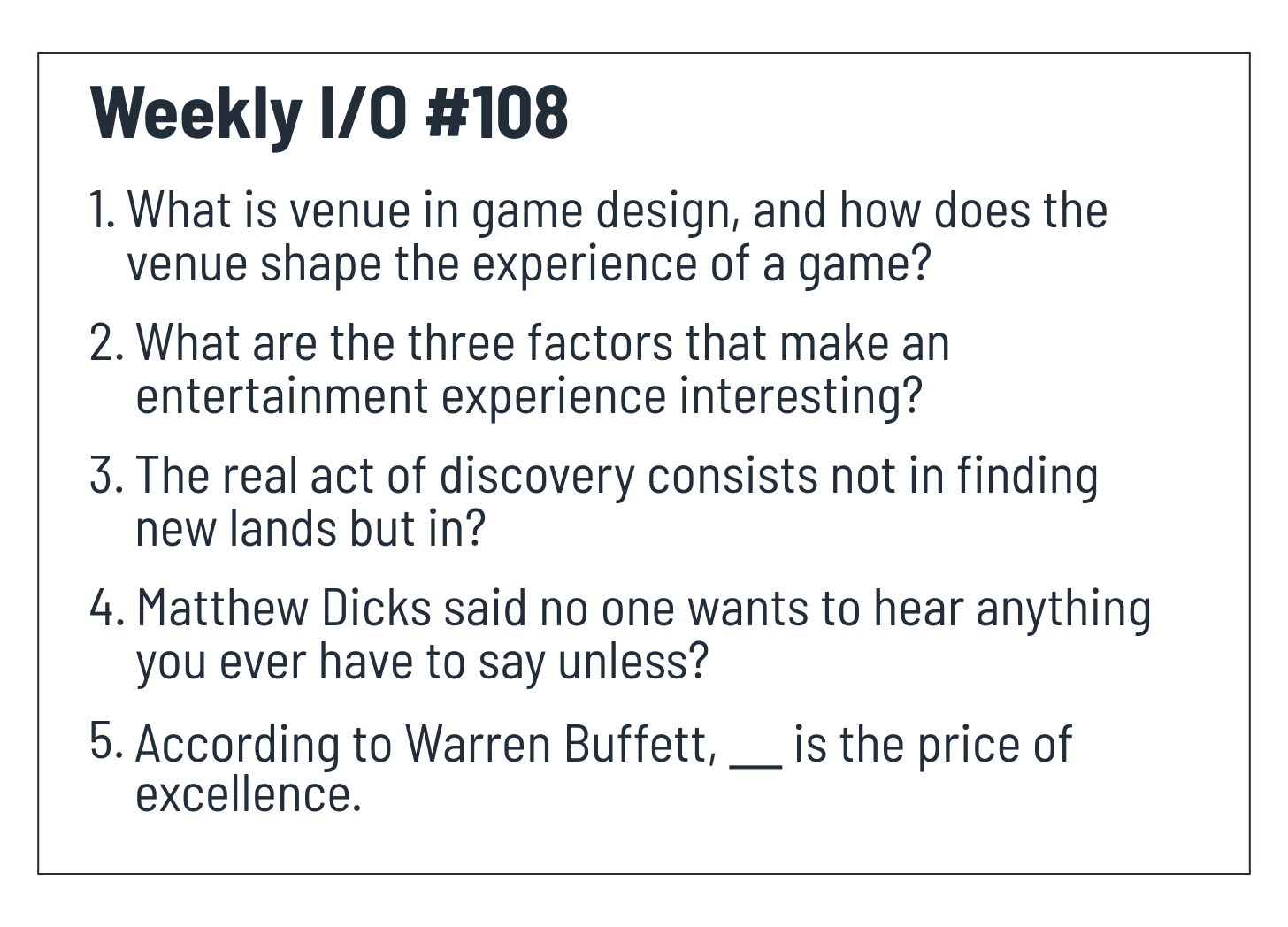
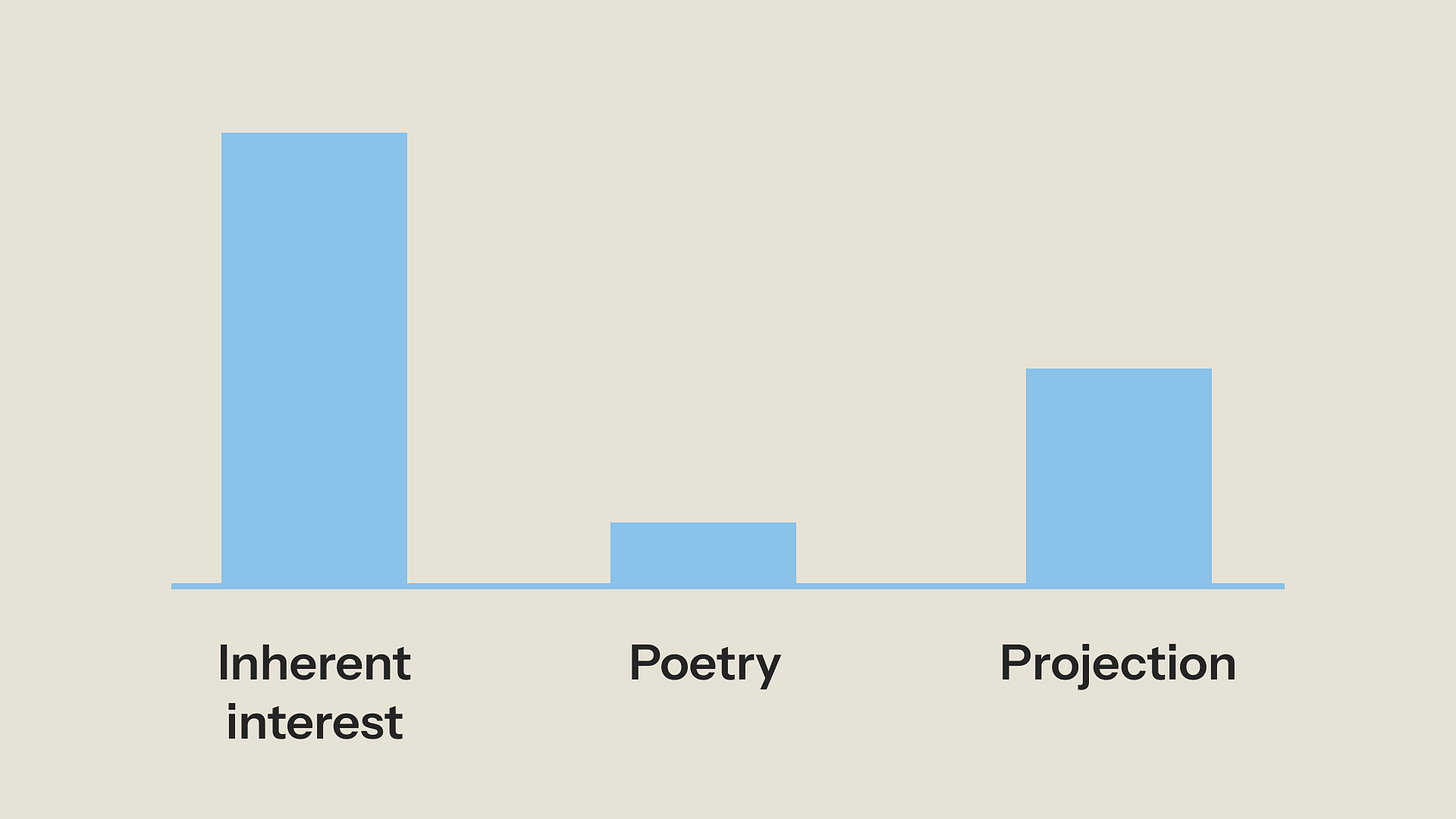
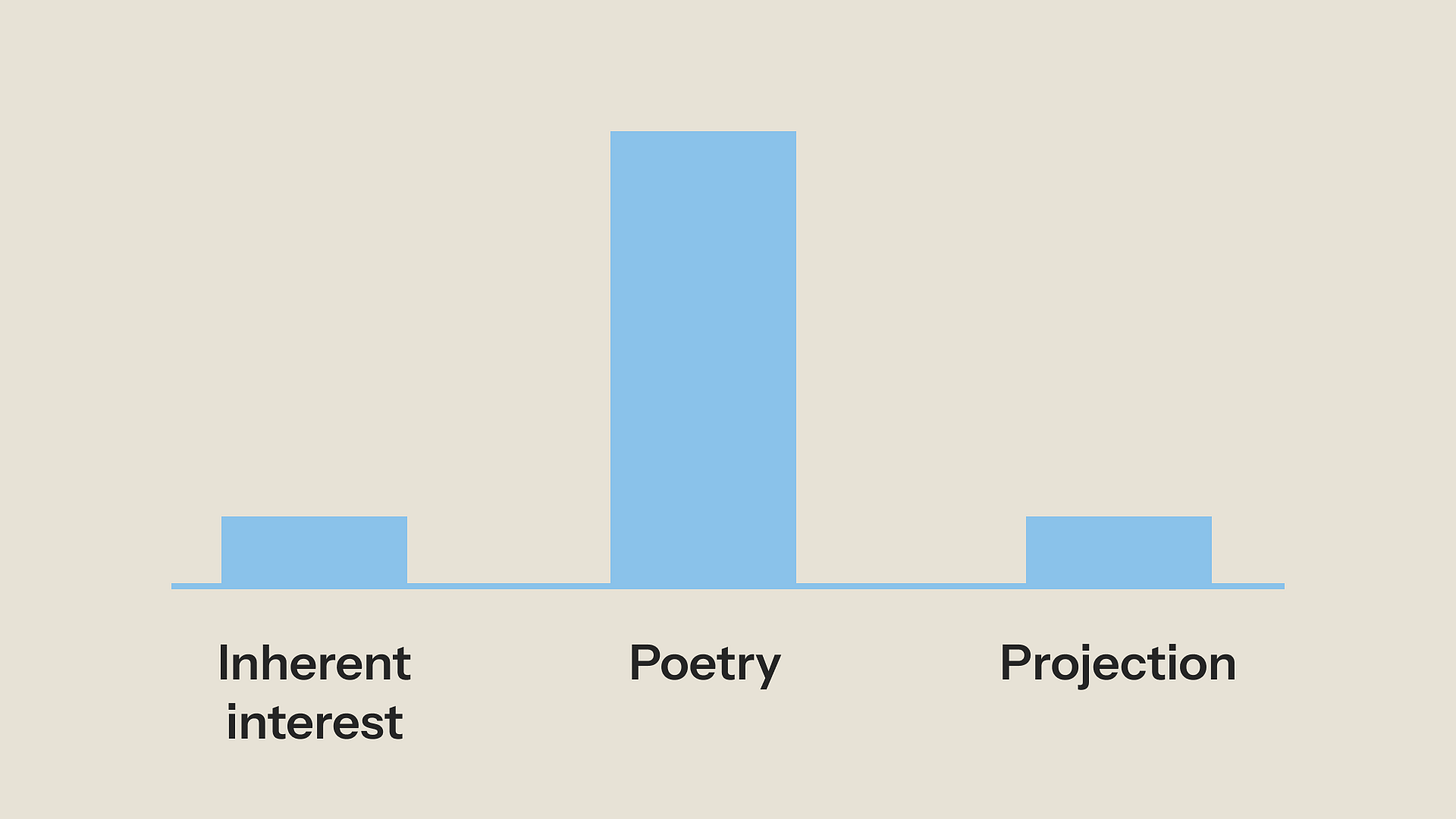
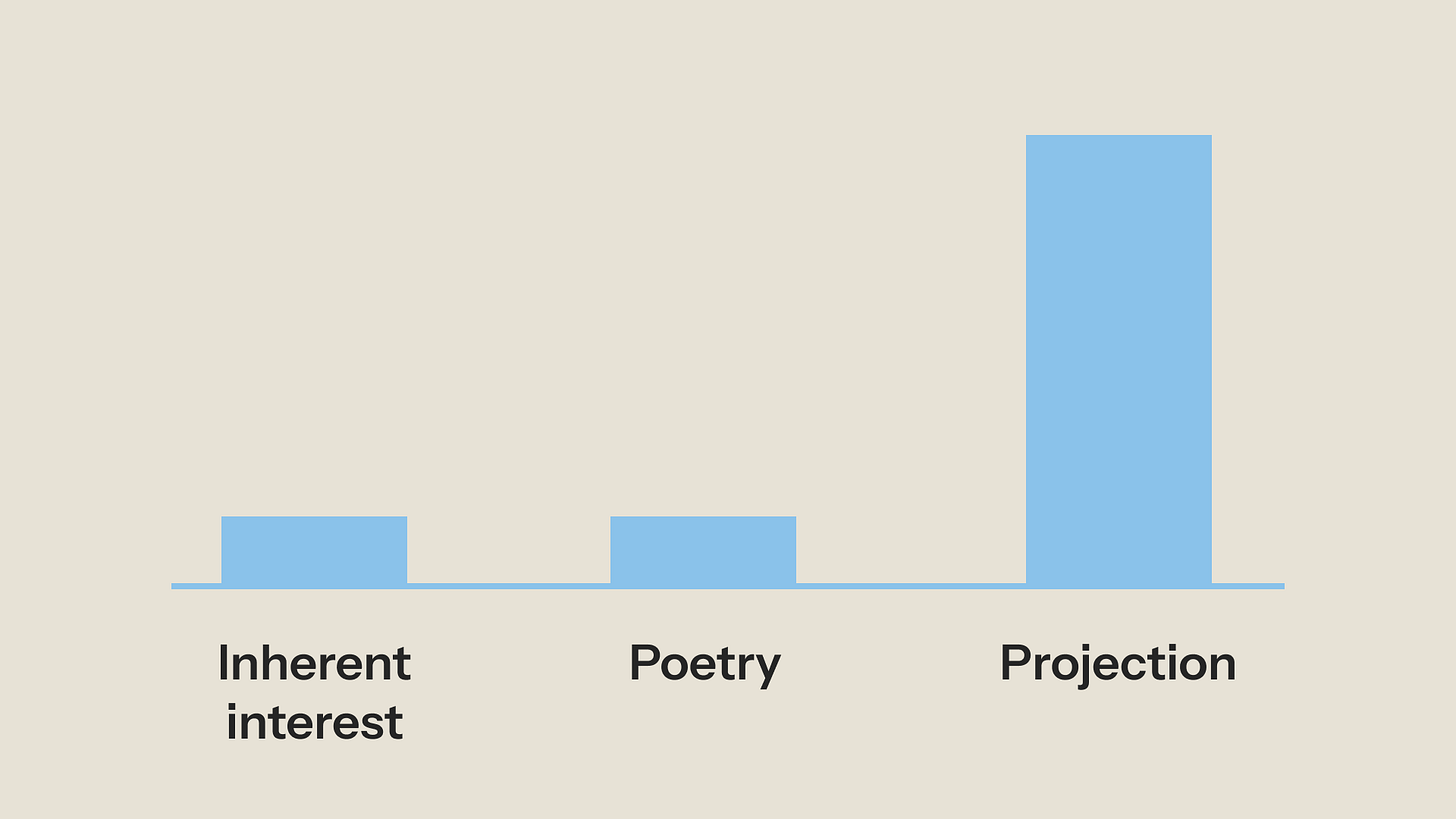
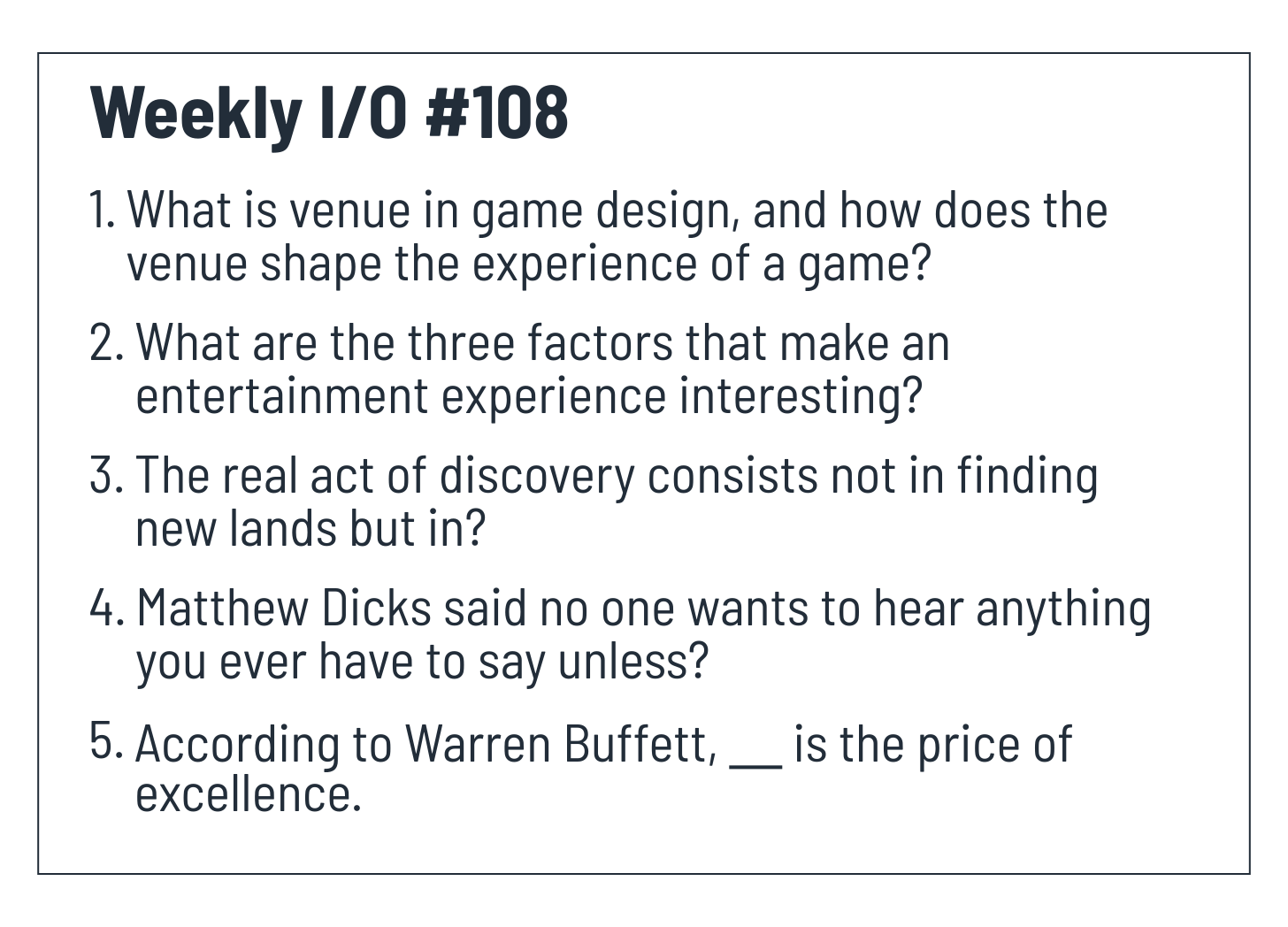
1 also reminds me of Virgil Abloh's interview where he talks about the space / environment all around changes the product's value and perception
https://youtu.be/GoombqVS-u4?si=1AXnLpCbnON7-L5e
I'm actually interested in your journey of reading War and Peace. 🙃 Good luck and have fun 🎈